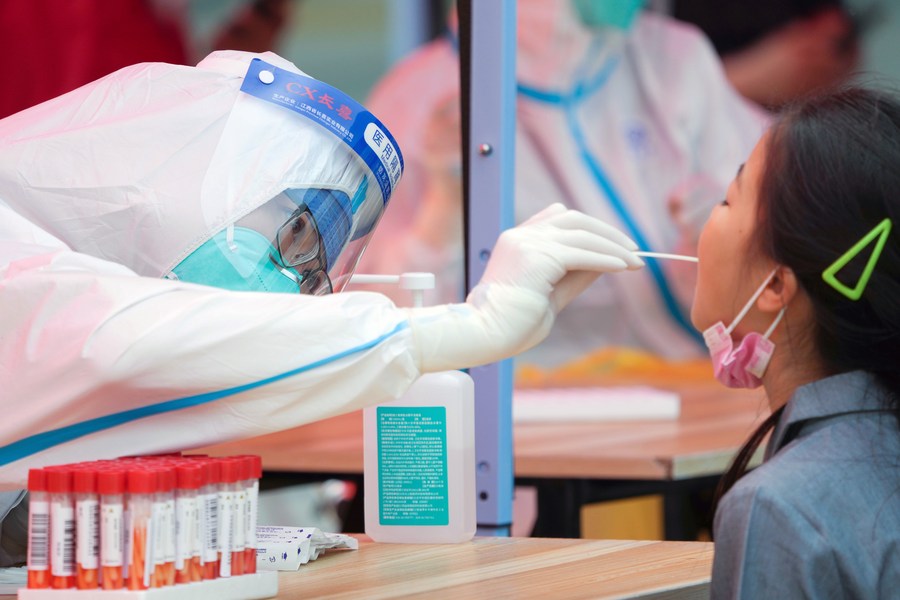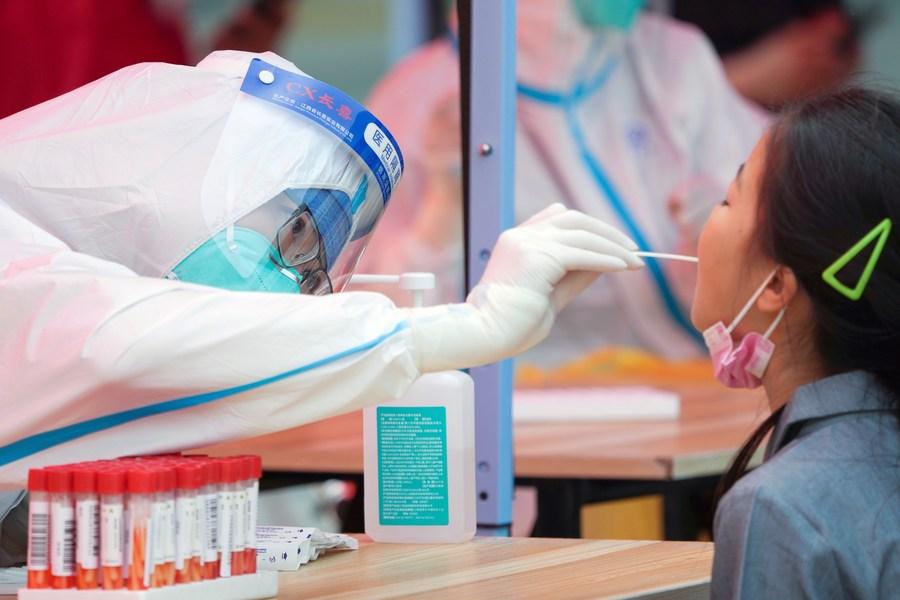
A medical worker takes a swab sample from a resident for a nucleic acid test in Chaoyang District, Beijing, capital of China, May 5, 2022. (Xinhua/Ju Huanzong)
BEIJING, May 9 (Xinhua) -- Amid the fight against the outbreaks of the highly transmissible Omicron variant, China is striving to accelerate the resumption of work and production to stabilize the economy.
By adhering to the dynamic zero-COVID policy that aims to curb flare-ups in the shortest possible time with the lowest social costs, the country has quickly returned to growth in 2020 and logged an 8.1-percent rise in 2021.
"Over the past two more years, China's dynamic zero-COVID approach has proven to be scientific and effective," said Li Bin, deputy head of the National Health Commission, noting that the stable epidemic prevention and control situation has provided a favorable environment for China to maintain economic development.
PRODUCTION RESUMPTION
China has since March withstood the most challenging COVID-19 control test since the anti-epidemic battle of Wuhan, and is promoting the resumption of work and production in an orderly manner.
With the number of new infections continuing to go down, Shanghai, the financial, manufacturing and commercial hub, is seeing more factories return to normal operations.
Up till now, the city has released two "white lists" of more than 1,800 enterprises to accelerate their resumption of work and production, aiming to ensure the stability of the industrial and supply chains, especially in the automotive, semiconductor and consumer electronics sectors.
By Thursday, over 70 percent of the 1,800-plus enterprises have resumed work and production.
After weeks of arduous control and prevention efforts, community transmission has been cut in the cities of Jilin and Changchun in northeast China's Jilin Province, where life is returning to normal and the resumption of production is accelerating.
By the end of April 28, about 14.17 million mu (944,667 hectares) of land had been sown in the province, faster than the same period last year.
On the southern front of China's COVID-19 battle, Shenzhen, a tech hub and one of the country's major foreign-trade centers, is also seeing businesses resume work and production. Its first-quarter gross domestic product (GDP) rose 2 percent year on year to 706.46 billion yuan (about 106.5 billion U.S. dollars).
MINIMIZING IMPACTS
In the face of sporadic resurgences of domestic COVID-19 cases, China has pledged greater efforts to mitigate the epidemic's impact on the economy.
Top authorities have called for more effective measures to achieve maximum effect in prevention and control with minimum cost and to reduce the impact on socioeconomic development as much as possible.
Since late April, the Communist Party of China leadership has held three meetings to analyze the current economic situation, calling for the healthy development of capital and strengthening infrastructure construction, vowing to step up policy support to stabilize the economy.
Experts believe that with its strong resilience and potential and vitality, the Chinese economy is well-positioned to overcome current risks and challenges.
Thanks to a slew of pro-growth measures, the country's economy got off to a steady start in 2022, with its GDP growing 4.8 percent year on year to 27.02 trillion yuan in the first three months, quickening from a 4-percent increase in the fourth quarter last year.
Value-added industrial output posted a stable 6.5-percent increase from a year ago in the first quarter, and fixed-asset investment jumped 9.3 percent. Retail sales of consumer goods went up 3.3 percent.
Despite mounting domestic and external uncertainties, China still remains a hotspot for foreign investors seeking predictable market opportunities at a difficult time amid the COVID-19 pandemic, thanks to the country's unremitting efforts in optimizing its business environment.
Foreign direct investment into the Chinese mainland, in actual use, expanded 25.6 percent year on year to 379.87 billion yuan in the first quarter, data from the Ministry of Commerce showed.
"The epidemic's impact is temporary and short-lived, and the economy will soon be back on track under efficient coordination between epidemic containment and economic development," said Zhao Chenxin, deputy director of the National Development and Reform Commission.




 A single purchase
A single purchase









